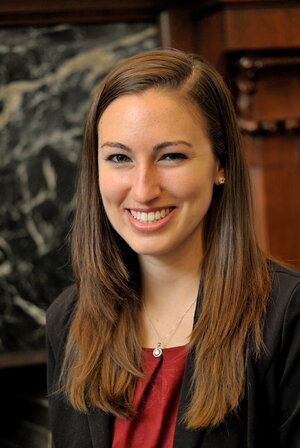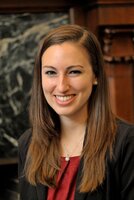Dr. Karle Flanagan has been named Director of Inclusive Data Science Education. Flanagan has long been involved in furthering the study of data science on campus. According to her, this started in the Summer of 2018, when she attended a conference at UC Berkeley which focused on how they teach data science courses and aim to integrate data science throughout their campus. When she returned, Flanagan was inspired to make data science education accessible here at UIUC. She partnered with Wade Fagen-Ulmschneider from the Computer Science Department to develop STAT 107: Data Science DISCOVERY. This course is UIUC’s first introductory data science gen ed. She said, “We wanted to make sure this class was inclusive. There are no prerequisites, and we designed the course so that any student, regardless of their background or major, can succeed.”
Karle explained that STAT 107 has grown from its original pilot class of 18 students in Spring 2019 to a course with over 600 students this past fall. This exponential growth is due to the care and diligence Flanagan and her colleagues put into the course. Based on the success of the course, it’s clear that students are excited to learn about the rapidly expanding field of data science! STAT 107 combines inferential thinking and statistics with Python programming and computation. Flanagan and Fagen-Ulmschneider emphasize communication throughout the course and give the students many opportunities to practice communicating their results with their peers. If you’d like to know more about STAT 107, or just data science in general, check out the Data Science Discovery website. Here, you can find free, open-source data science lessons and content about a wide variety of topics. This website includes datasets, videos, written content, data science guides, small projects, and practice questions.
Outside of teaching, creating courses, and drafting online resources for students, Flanagan shared that she’s currently working with colleagues across campus to develop X + Data Science majors here at UIUC. For these majors, students take a series of eight data science classes, starting with STAT 107, to complete the “data science” part of the program. They also take courses in their domain (“X”) and complete a discovery or research experience as an upperclassman. Karle said, “The goal is to continue to make different X + Data Science majors available for all students, including majors that are not technical or math heavy.” Another project that Dr. Flanagan has in the works includes taking her work in data science off campus. She said, “For the past 3 summers, we have been teaching data science to high school students in Chicago through DPI’s Digital Scholars program.” This collaboration between DPI and UIUC has given almost 100 high school students an introduction to data science and allowed them to learn how they can use it to explore different topics they are interested in.
Flanagan explained how feedback from her students has influenced and informed the courses and programs she’s developed, “A lot of our students are really interested in how data science is involved in exploring social issues, so that’s one thing that I’m really trying to add to the intro courses so that students see that data science for social justice is a key part of data science.” In developing courses, Flanagan employs what she likes to call the Data Science Justice Initiative. This has to do with understanding how data is collected in relation to society. “Who collected this data? What are the implications of collecting the data? What data specifically wasn’t collected? It’s important to have these conversations, it’s similar to data science ethics, but I like to think of it as data justice.”
All in all, Karle Flanagan is excited to begin her new role as the Director of Inclusive Data Science Education. “This position allows me to continue to work on the X + Data Science initiative and to lead the College of LAS in developing more undergraduate programs for different majors. (…) I think it’s really important that Illinois is a leader in this space. We’re already becoming a leader in data science education. The intersection of data science education and social justice is something that we can continue to work on and share with the rest of the world. I’m most excited to see how we can continue to make an impact both here and beyond the university. We want to change the way the world sees data science.”
2023-05-15
Elizabeth McNutt

